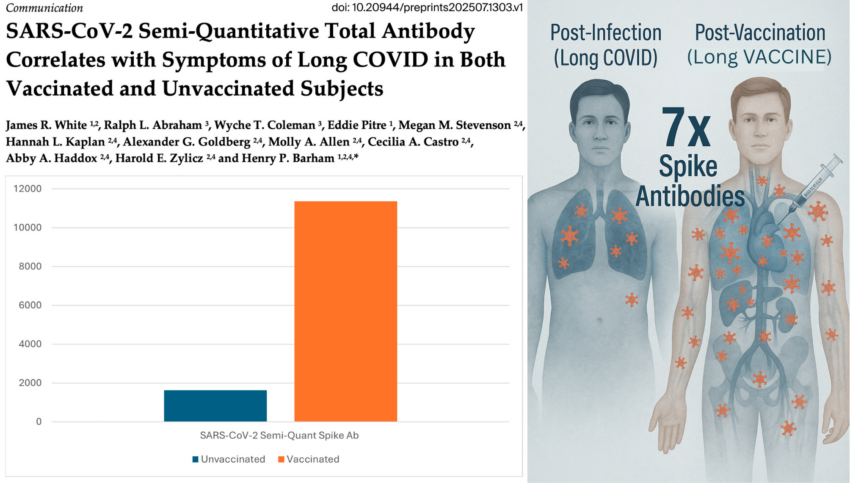A new Preprint study titled, SARS-CoV-2 Semi-Quantitative Total Antibody Correlates with Symptoms of Long COVID in Both Vaccinated and Unvaccinated Subjects, adds weight to the growing body of evidence suggesting that persistent spike protein underlies post-vaccination syndromes:
Key Findings
Study Population:
• N = 100 total patients with chronic post-COVID-like symptoms
• 81 vaccinated individuals with post-vaccination syndrome (no comorbidities)
• 19 unvaccinated individuals with confirmed prior infection and Long COVID symptoms
• All participants were at least 3 months past infection or vaccination
Spike Antibody Levels:
• Vaccinated group: 11,356 U/mL average spike antibody level (range: 1,291 to >25,000)
• Unvaccinated group: 1,632 U/mL average (range: 1.5 to 4,614)
→ Vaccinated individuals had 7x higher spike antibody levels, despite no recent infection
Common Symptoms Across Both Groups:
• Fatigue (81%)
• Brain fog (76%)
• Headaches (75%)
• Muscle/joint aches (71%)
• Anxiety (54%)
• Sleep irregularity, tinnitus, chest tightness, shortness of breath, and GI issues also prevalent
Hypothesized Mechanism:
• Persistent circulating spike → immune complex formation → deposition in tissues
• Chronic antibody production → immune fatigue and dysregulation (e.g. low pneumococcal titers)
• Authors raise concern that mRNA vaccine-induced spike may lead to prolonged inflammation, neurocognitive symptoms, and possibly oncogenic changes
This is one of the first real-world studies to directly compare immune signatures in vaccinated and unvaccinated individuals with Long COVID-like syndromes. Despite differing exposures, both groups shared similar symptom burdens — but vaccinated patients had far higher levels of spike antibodies, months to years post-injection.
As we await widespread access to direct spike protein testing, elevated spike antibody levels serve as a reliable proxy for ongoing spike protein burden in the body. With vaccinated individuals showing 7 times higher spike antibodies, this suggests a substantially greater spike exposure — and therefore, a higher risk of multisystem damage.
Over 375 peer-reviewed studies show that spike protein alone is highly pathogenic to all organ systems:
Thus, strategies aimed at reducing spike protein burden — such as the McCullough Protocol: Base Spike Detoxification — are essential in the interim. While we await large, prospective, randomized, double-blind, placebo-controlled trials that directly quantify spike protein levels and adjudicate clinical outcomes, this evidence-informed approach remains among the most prudent courses of action currently available.
Epidemiologist and Foundation Administrator, McCullough Foundation
www.mcculloughfnd.org
Please consider following both the McCullough Foundation and my personal account on X (formerly Twitter) for further content.
Click this link for the original source of this article.
Author: Nicolas Hulscher, MPH
This content is courtesy of, and owned and copyrighted by, https://petermcculloughmd.substack.com and its author. This content is made available by use of the public RSS feed offered by the host site and is used for educational purposes only. If you are the author or represent the host site and would like this content removed now and in the future, please contact USSANews.com using the email address in the Contact page found in the website menu.










